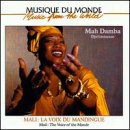| All Artists: Mah Damba, Mamaye Kouyate Et Son Ensemble Title: Djelimousso, Mali: The Voice of the Mande Members Wishing: 0 Total Copies: 0 Label: Buda Musique Original Release Date: 5/16/2000 Release Date: 5/16/2000 Album Type: Import Genres: International Music, New Age, Pop Style: Africa Number of Discs: 1 SwapaCD Credits: 1 UPCs: 723723835925, 3229269274923, 3700368406816 |
Search - Mah Damba, Mamaye Kouyate Et Son Ensemble :: Djelimousso, Mali: The Voice of the Mande
 | Mah Damba, Mamaye Kouyate Et Son Ensemble Djelimousso, Mali: The Voice of the Mande Genres: International Music, New Age, Pop
|
Larger Image |
CD Details |
CD ReviewsBeautiful traditional Bambara music "Ian Herrick" | San Jose, CA | 03/16/2005 (5 out of 5 stars) "The Bambaras, Mali's largest ethnic group, have many famous musicians in their ranks. It is odd, then, that most of the music heard in the west, while it may be traditional material, is played on non-African instruments. For instance, Amadou Diabate's album "Djiriyo" with its electric guitars (played of course in a Bambara style), keyboard, and punctuating trumpets. Or Amadou and Miriam's albums, filled with horns and Indian percussion. Rokia Traore brings another perspective; her music is played primarily on traditional instruments but in a very non-traditional style. The music of Habib Koite and Bamada is a mixture of traditional and modern instruments, and much of it has a strong Cuban influence.
Here, however, we have traditional Bambara music played on traditional instruments (with the exception of the ubiquitous guitar). This is beautiful music, Mah Damba is one of my favorite Malian singers, right up there with Oumou Sangare and Kandia Kouyate. Her smoky vocals slide through the crisp, clean playing of the guitar and ngonis like a snake over desert sand. The main ngoni here is played by Mah's husband, the incomparable Mamaye Kouyate. The string instruments, playing in that crisp Bambara style, produce bouncy rhythms which remind me of Venezuelan or Cuban folk music. The percussion is provided by nothing more than the slapping of the string instruments, hand claps, and the earthy thumps and clicks of Mahkan Tounkara's hands on the calabash. The essential backing female vocals are lower and more metallic than the girlish piping heard in Wassalou music, which sounds exactly right. The songs here are traditional griot themes. I am constantly amazed at African musicians' ability to impart mood to their audience even through the language barrier -- when Mah sings Simbala Kone, accompanied by thumping calabash and dry ngoni lines, it SOUNDS epic, so that we know it must be about some hero or martyr of Bambara history." |

 Track Listings (10) - Disc #1
Track Listings (10) - Disc #1